Small Tassel for a Great Overcoming: A Shining Weekend for Commencement
Posted on May 19, 2021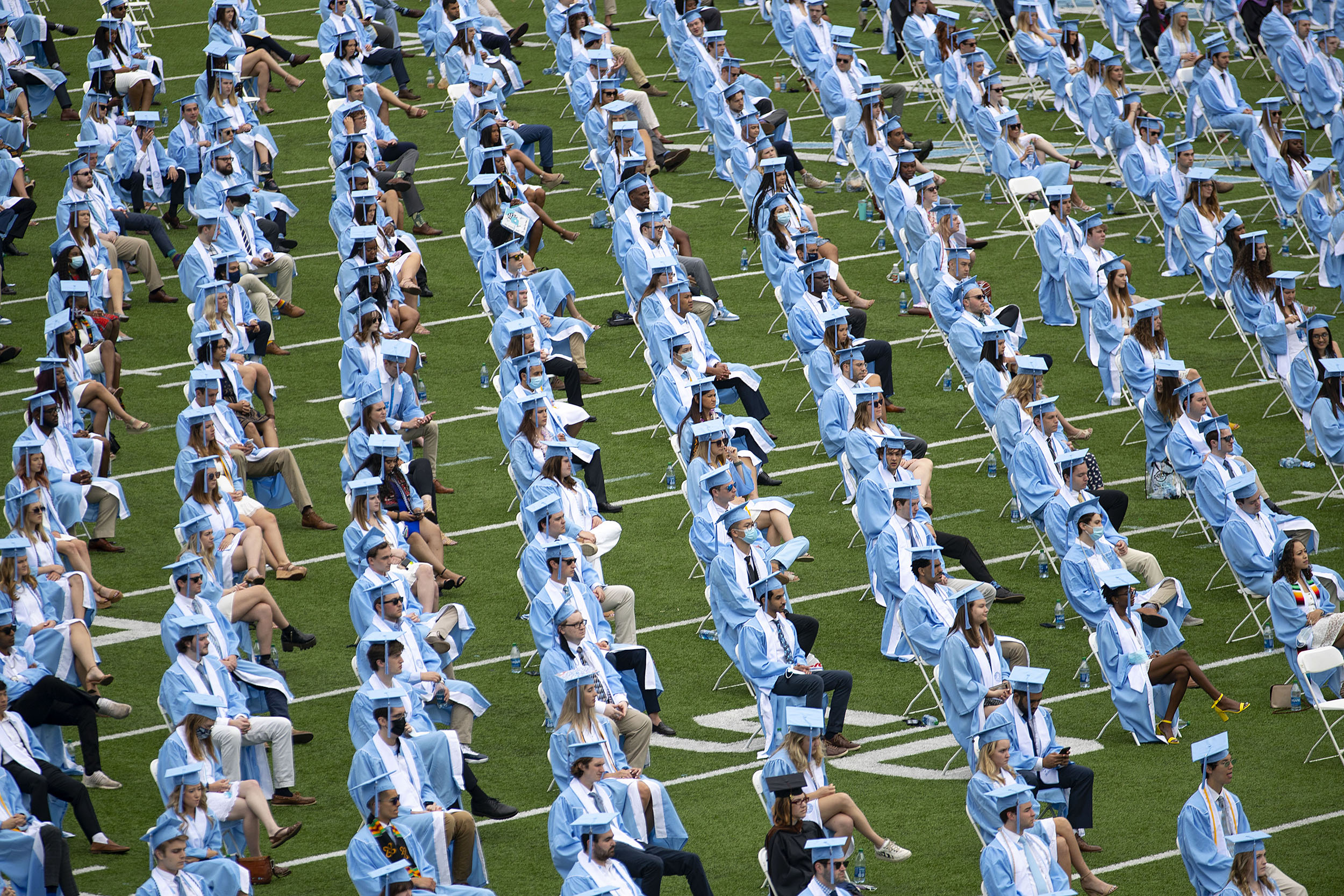
(Alex Kormann ’19)
After a senior year like no other, graduating Tar Heels experienced a spring Commencement like no other.
Over the May 14-16 weekend, Carolina celebrated the graduation of nearly 6,300 students across five ceremonies in Kenan Stadium and virtually, where graduates received advice for post-college life from Dr. Anthony Fauci and Kizzmekia Corbett ’14 (PhD), leading experts on COVID-19 pandemic research and national response strategies.
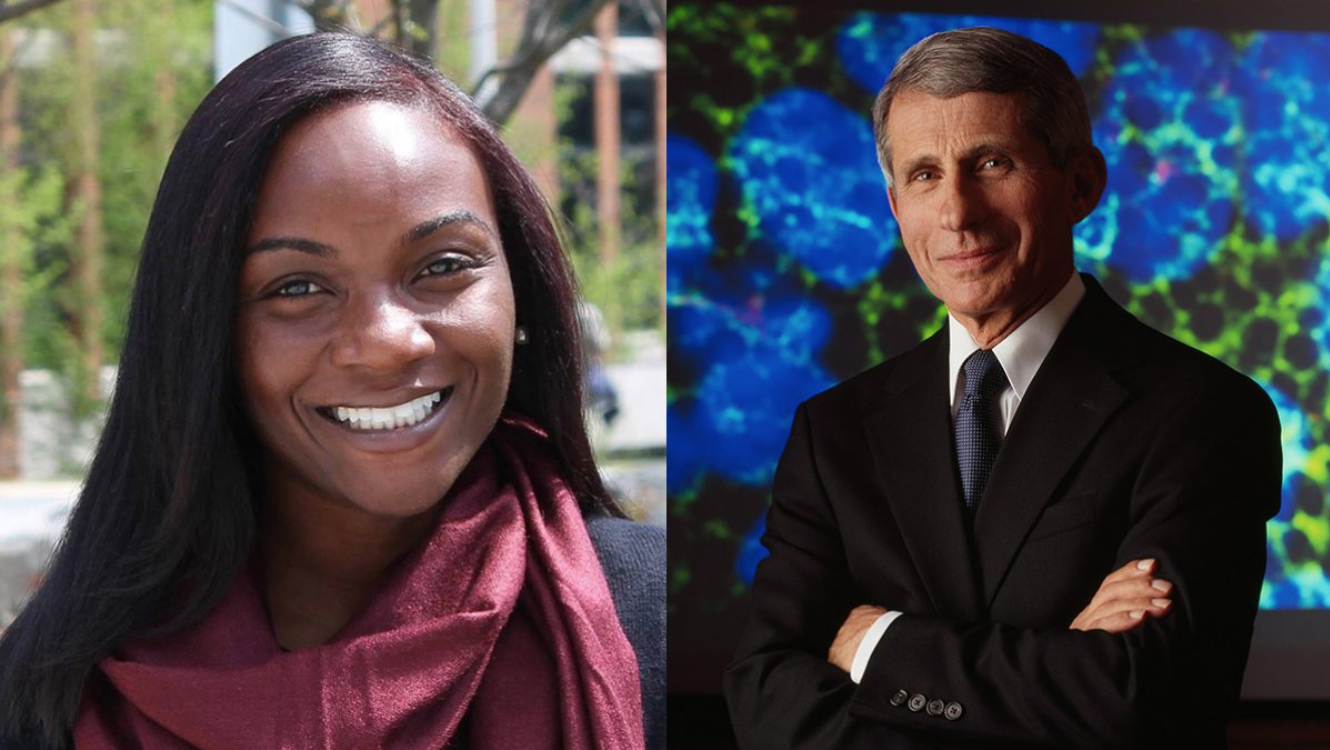
Kizzmekia Corbett ’14 (PhD), left; Dr. Anthony Fauci
Chancellor Kevin M. Guskiewicz presided over the ceremonies, which marked the graduation of 4,068 undergraduates, 1,588 graduate students and 627 professional students.
“Why is it important to move a small tassel six inches across your face?” Guskiewicz asked the graduates. “Why does that matter? I hope you feel it in your bones that this is important. But even if you don’t right now, I bet you’ll look back and know instinctively that this ceremony and taking this moment to reflect wherever you are is important. First, your story matters. Each of you is a different person from the person who came to Carolina years ago.
“Rituals ground us in the familiar and remind us of our place in the word. John F. Kennedy once said: ‘Do not pray for easy lives. Pray to become stronger.’ ”
Fauci and Corbett delivered their Commencement addresses virtually to the class of 2021, praising Carolina’s newest alumni for their resiliency.
Both noted how the challenges of the past year had shaped graduates. “What you have experienced as a result of the profound upending of your lives by COVID-19 is truly unprecedented,” said Fauci, director of the U.S. National Institute of Allergy and Infectious Diseases.
He noted that the class had risen to the occasion. “How you have responded to this pandemic thus far gives me confidence that you will adjust and you will thrive. You are going to play an important role in shaping this new normal. Perhaps it can even be a better normal.”
Corbett, a research fellow and scientific lead at the National Institute of Allergy and Infectious Diseases’ Vaccine Research Center, focused on the importance of home — a word, she said, that “most certainly takes on a different meaning after the past year.”
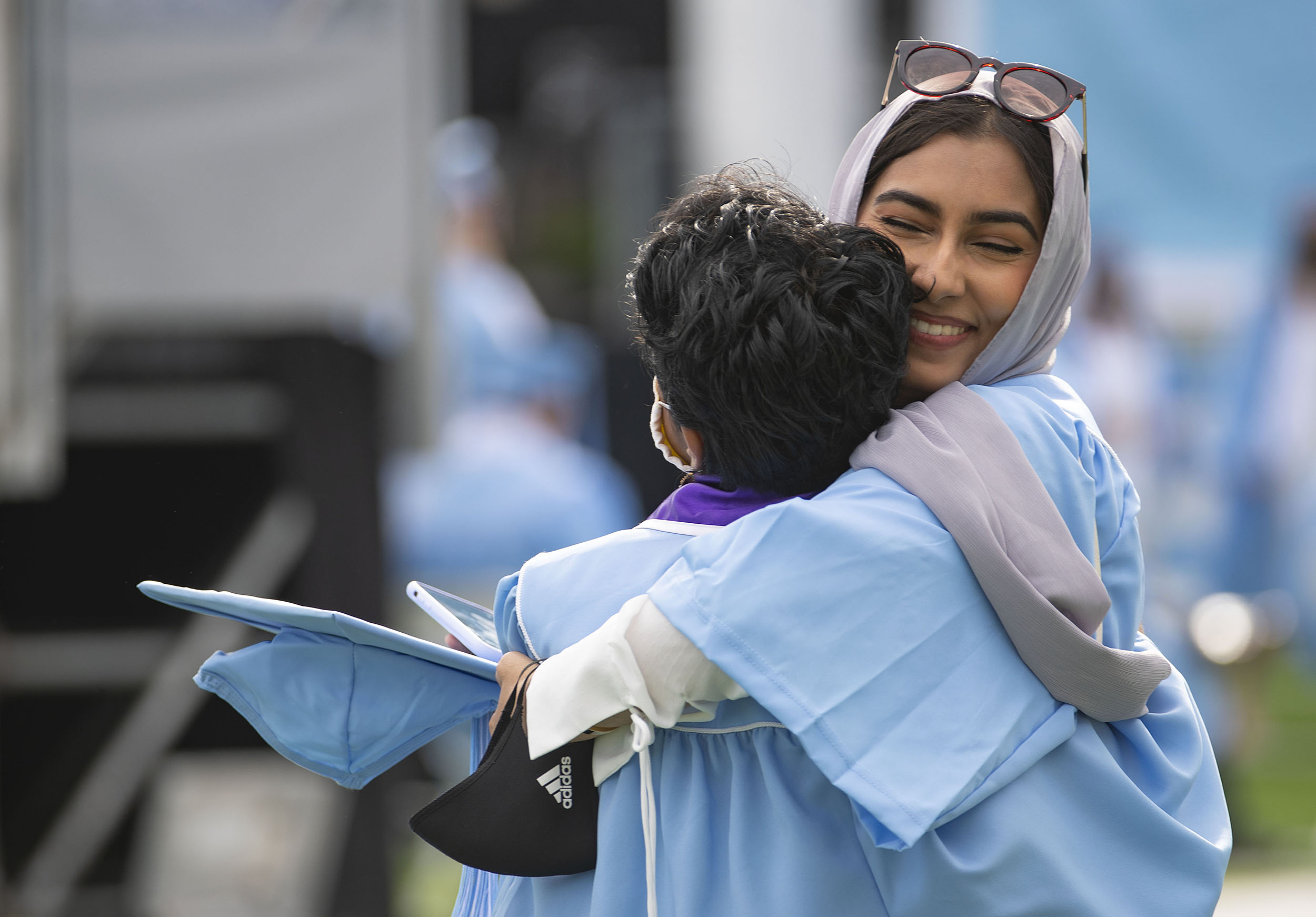
(Alex Kormann ’19)
She talked about Thanksgiving 2019, when she visited her family near Hillsborough and shared with those gathered at her grandmother’s house that she was “consistently thankful” to have a place to call home. No matter where graduates’ paths take them, she reminded them of the power of home. “Home just isn’t about the place you were raised. Home is … the culmination of places that amass experiences that shape who you are, that shape who you will be. Home is Carolina.”
Work by Corbett and her vaccines and immunopathogenesis team was crucial to the development of the Moderna COVID-19 vaccine, and she was profiled in the September/October 2020 issue of the Carolina Alumni Review. On May 11, Harvard University announced that Corbett is joining its faculty of the T.H. Chan School of Public Health as an assistant professor in the department of immunology and infectious diseases and as the Shutzer Assistant Professor at the Harvard Radcliffe Institute.
Graduate school
The Graduate School honored more than 1,000 doctoral degree recipients from August 2019 through May 2021 in a virtual hooding ceremony to celebrate scholars across many areas of study. More than 200 doctoral graduates earned their degrees in May 2021.
Suzanne Barbour, dean of the Graduate School, said continued resiliency from students during the COVID-19 pandemic will endure at the University in many ways.
“You are our next generation of leaders — and you have showcased your leadership skills, dedication to our students and commitment to our state during a year that required innovation and imagination,” Barbour said. “You have worked tirelessly to seize opportunities here at Carolina and have made remarkable contributions to our community, to the state and beyond.”
Mary Sue Coleman ’69 (PhD), former president of the Association of American Universities, was the keynote speaker. Coleman became president of the AAU in May 2016. She previously was president of the University of Michigan (2002-14), president of the University of Iowa (1995-2002), provost of the University of New Mexico (1993-95) and associate provost and dean of research and vice chancellor for graduate studies at Carolina (1990-93).
“In the best of times, doctoral studies can be a lonely pursuit. You accomplished your work during the most isolating, frightening time in our lives. We need the knowledge you are creating and the truths you are sharing.”
—Mary Sue Coleman ’69 (PhD)
“You and I are bound by more than the academic hoods that signify our academic accomplishments,” Coleman said. She drew comparisons between the 1960s and the 2020s in terms of calls for equity, justice and notable advances in science, technology and the humanities.
“In the best of times, doctoral studies can be a lonely pursuit. You accomplished your work during the most isolating, frightening time in our lives,” Coleman said. “We need the knowledge you are creating and the truths you are sharing.”
Nine people received honorary degrees during Commencement — four chosen in 2021 and five from 2020, when spring graduation ceremonies were postponed due to the COVID-19 pandemic.
Recipients for 2021, in addition to Corbett and Fauci, were:
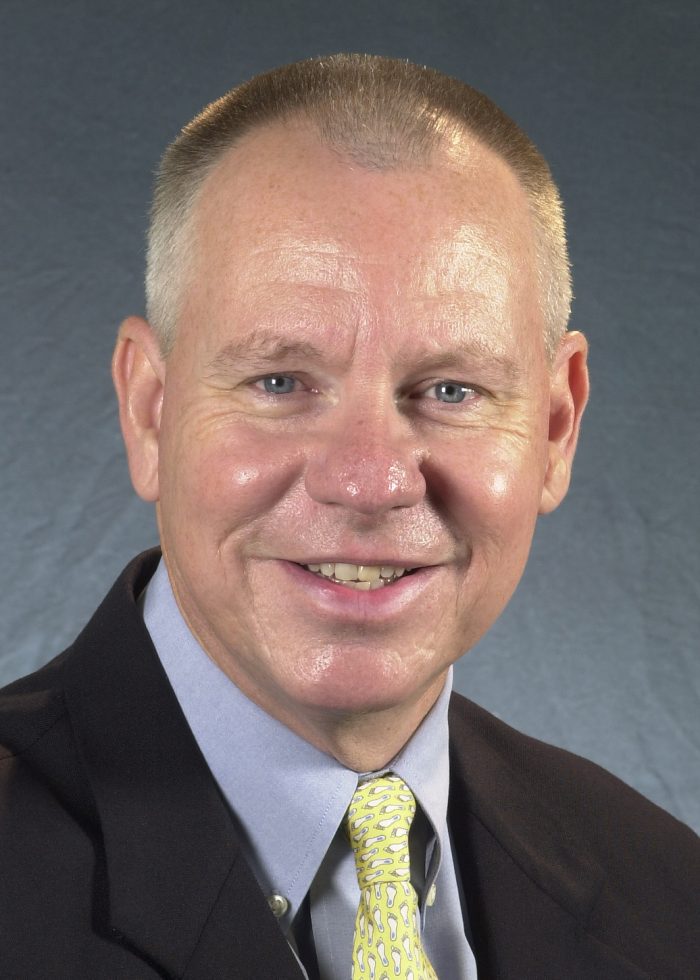 • Lowry Caudill ’79, described as “the Tar Heel version of a Renaissance man.” Over the course of his career, Caudill has excelled in science, business and philanthropy. After earning his doctorate in chemistry at Indiana University, he worked for Glaxo Inc. In 1991, Caudill and a colleague started Magellan Laboratories, a pharmaceutical development company. After selling this company in 2002, Caudill became worldwide president of pharmaceutical development for Cardinal Health, leading more than 1,400 employees in nine sites in the U.S. and Europe. He chaired the Chancellor’s Innovation Circle, which created the Innovate@Carolina Roadmap; led the searches for the current athletics director and vice chancellor for university development; served on the steering committee for the Carolina First Campaign; and currently is a co-chair for the Campaign for Carolina. He played a key role in the creation of the College of Arts and Sciences’ applied physical sciences department, the first new basic science department at Carolina in more than 40 years. He is a former member and chair of UNC’s Board of Trustees and is a current member of the GAA Board of Directors. Caudill received UNC’s Distinguished Alumnus Award in 2008 and the GAA’s Distinguished Service Medal in 2014. UNC’s chemistry building, Caudill Laboratories, is named in honor of Caudill and his wife, Susan Self Caudill ’80.
• Lowry Caudill ’79, described as “the Tar Heel version of a Renaissance man.” Over the course of his career, Caudill has excelled in science, business and philanthropy. After earning his doctorate in chemistry at Indiana University, he worked for Glaxo Inc. In 1991, Caudill and a colleague started Magellan Laboratories, a pharmaceutical development company. After selling this company in 2002, Caudill became worldwide president of pharmaceutical development for Cardinal Health, leading more than 1,400 employees in nine sites in the U.S. and Europe. He chaired the Chancellor’s Innovation Circle, which created the Innovate@Carolina Roadmap; led the searches for the current athletics director and vice chancellor for university development; served on the steering committee for the Carolina First Campaign; and currently is a co-chair for the Campaign for Carolina. He played a key role in the creation of the College of Arts and Sciences’ applied physical sciences department, the first new basic science department at Carolina in more than 40 years. He is a former member and chair of UNC’s Board of Trustees and is a current member of the GAA Board of Directors. Caudill received UNC’s Distinguished Alumnus Award in 2008 and the GAA’s Distinguished Service Medal in 2014. UNC’s chemistry building, Caudill Laboratories, is named in honor of Caudill and his wife, Susan Self Caudill ’80.
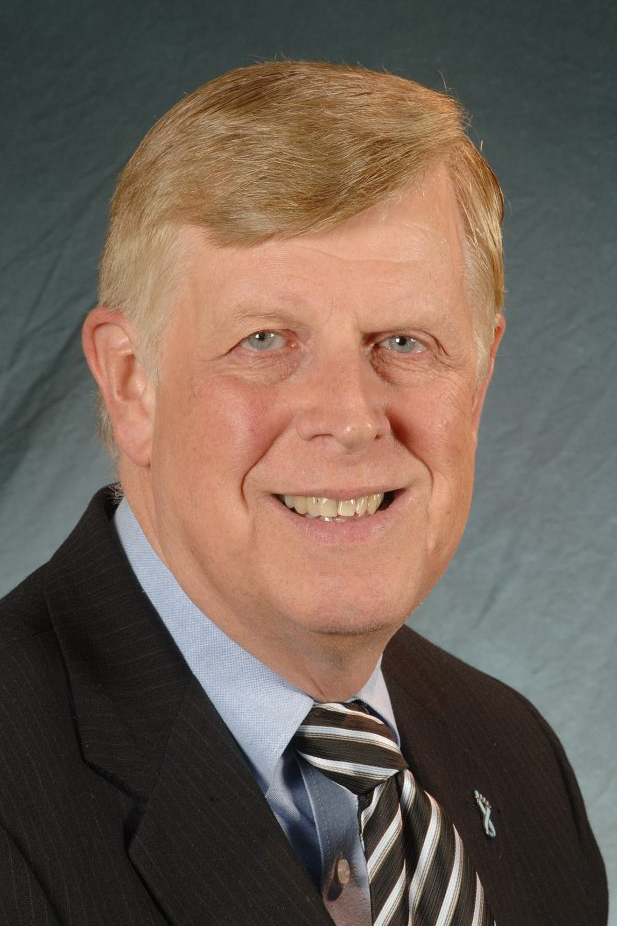 • Don Curtis ’63, a pioneer in cable television. Early in his career, Curtis acquired a number of franchises and built some of North Carolina’s first cable systems. In 1967, he sold his interests in cable TV and built his first radio station. Over the decades that followed, he became a major figure in broadcasting as chair and CEO of Curtis Media Group, which owns and operates 32 leading radio brands across North Carolina. The company also operates the N.C. News Network, the Triangle Traffic Network, the Southern Farm Network and the ACC Sports Journal. A member of the N.C. Broadcasters’ Hall of Fame, Curtis has served numerous terms on UNC-TV’s board of trustees. Curtis served on UNC’s Board of Trustees and, in 2005, received the William Richardson Davie Award, the board’s highest honor recognizing extraordinary service to the University and the state. He is a former member and chair of the GAA Board of Directors and earned the GAA’s Distinguished Service Medal in 2014. He is a past member of UNC’s Lineberger Comprehensive Cancer Center’s board of visitors, and he founded the UNC Children’s Hospital Radiothon, which has raised tens of millions of dollars since 1998. He also has been a member of the UNC Health Care System board of directors. Carolina renamed Memorial Hall’s auditorium as the Beasley-Curtis Auditorium to honor his contribution in renovating this space for the arts. In 2018, the Curtis Foundation announced a transformational gift to the University of more than $21 million to support the Hussman School of Journalism and Media, the School of Medicine, UNC Hospitals and UNC athletics. He is a member of the UNC School of Media and Journalism Hall of Fame.
• Don Curtis ’63, a pioneer in cable television. Early in his career, Curtis acquired a number of franchises and built some of North Carolina’s first cable systems. In 1967, he sold his interests in cable TV and built his first radio station. Over the decades that followed, he became a major figure in broadcasting as chair and CEO of Curtis Media Group, which owns and operates 32 leading radio brands across North Carolina. The company also operates the N.C. News Network, the Triangle Traffic Network, the Southern Farm Network and the ACC Sports Journal. A member of the N.C. Broadcasters’ Hall of Fame, Curtis has served numerous terms on UNC-TV’s board of trustees. Curtis served on UNC’s Board of Trustees and, in 2005, received the William Richardson Davie Award, the board’s highest honor recognizing extraordinary service to the University and the state. He is a former member and chair of the GAA Board of Directors and earned the GAA’s Distinguished Service Medal in 2014. He is a past member of UNC’s Lineberger Comprehensive Cancer Center’s board of visitors, and he founded the UNC Children’s Hospital Radiothon, which has raised tens of millions of dollars since 1998. He also has been a member of the UNC Health Care System board of directors. Carolina renamed Memorial Hall’s auditorium as the Beasley-Curtis Auditorium to honor his contribution in renovating this space for the arts. In 2018, the Curtis Foundation announced a transformational gift to the University of more than $21 million to support the Hussman School of Journalism and Media, the School of Medicine, UNC Hospitals and UNC athletics. He is a member of the UNC School of Media and Journalism Hall of Fame.
The 2020 recipients were:
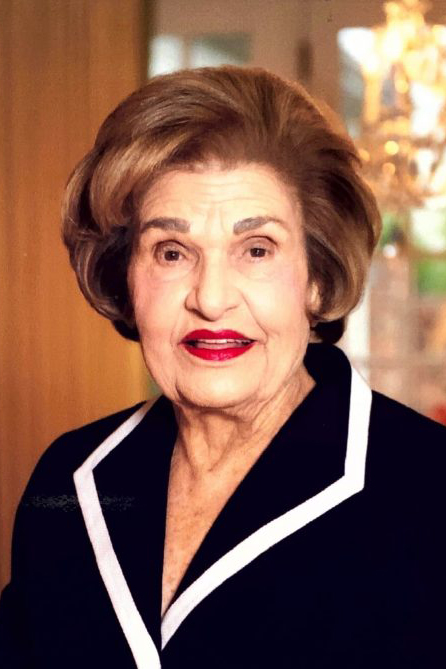 • Anne Cates ’53, who has played numerous important leadership roles with the University and was key in establishing the George Watts Hill Alumni Center and The Carolina Club. Cates is a past member of the Educational Foundation’s board of directors and former vice chair of UNC’s Board of Visitors, and she led the kickoff celebration for Carolina’s Bicentennial Campaign. She was the first woman to chair UNC’s Board of Trustees and went on to serve on the UNC System Board of Governors. Cates received the William Richardson Davie Award in 1991. She is a former member and chair of the GAA Board of Directors and received the GAA’s Distinguished Service Medal in 1991.
• Anne Cates ’53, who has played numerous important leadership roles with the University and was key in establishing the George Watts Hill Alumni Center and The Carolina Club. Cates is a past member of the Educational Foundation’s board of directors and former vice chair of UNC’s Board of Visitors, and she led the kickoff celebration for Carolina’s Bicentennial Campaign. She was the first woman to chair UNC’s Board of Trustees and went on to serve on the UNC System Board of Governors. Cates received the William Richardson Davie Award in 1991. She is a former member and chair of the GAA Board of Directors and received the GAA’s Distinguished Service Medal in 1991.
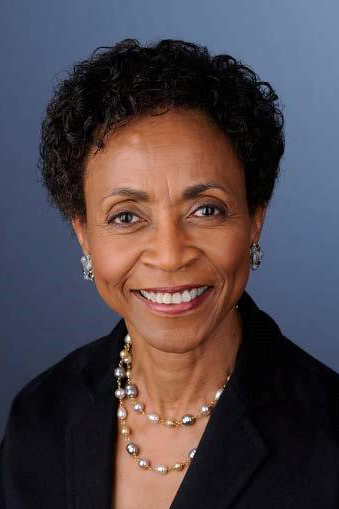 • Bernadette Gray-Little, who, before becoming chancellor of the University of Kansas in 2009, was UNC’s executive vice chancellor and provost (2006-09) and dean of the College of Arts and Sciences (2004-06). She retired from KU in 2017. Gray-Little began her academic career at Carolina in 1971 as an assistant professor and later became chair of the psychology department. She received the GAA’s Distinguished Service Medal in 2009 and was inducted into both the Order of the Golden Fleece and the Order of the Grail-Valkyries. In 2014, she received the William Richardson Davie Award.
• Bernadette Gray-Little, who, before becoming chancellor of the University of Kansas in 2009, was UNC’s executive vice chancellor and provost (2006-09) and dean of the College of Arts and Sciences (2004-06). She retired from KU in 2017. Gray-Little began her academic career at Carolina in 1971 as an assistant professor and later became chair of the psychology department. She received the GAA’s Distinguished Service Medal in 2009 and was inducted into both the Order of the Golden Fleece and the Order of the Grail-Valkyries. In 2014, she received the William Richardson Davie Award.
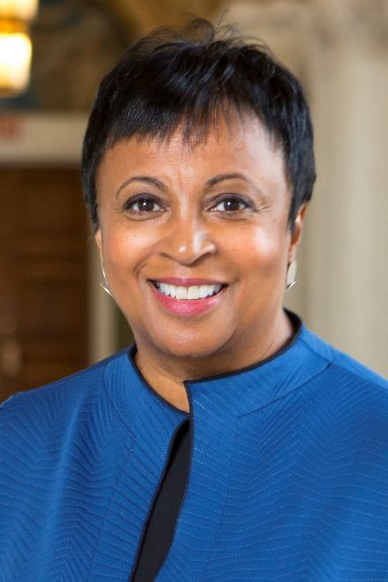 • Carla Hayden, who was sworn in as the 14th Librarian of Congress in September 2016. Hayden, the first woman and the first African American to lead the national library, was CEO of the Enoch Pratt Free Library in Baltimore for 23 years. She is a past president of the American Library Association (2003-04).
• Carla Hayden, who was sworn in as the 14th Librarian of Congress in September 2016. Hayden, the first woman and the first African American to lead the national library, was CEO of the Enoch Pratt Free Library in Baltimore for 23 years. She is a past president of the American Library Association (2003-04).
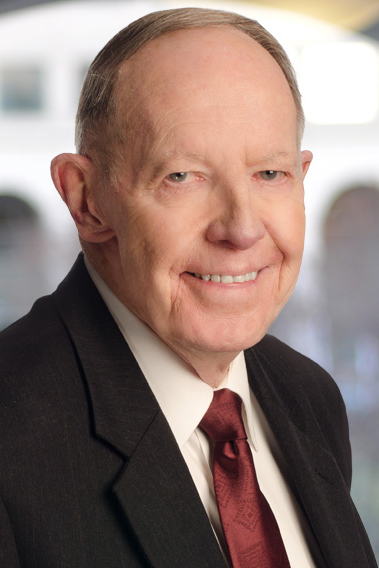 • I. Beverly Lake Jr., a former chief justice of the N.C. Supreme Court and a state legislator with an exemplary career of public service. Lake began his law career in private practice and later served as the state’s deputy attorney general (1969-76). He subsequently served two terms in the N.C. Senate, was elected to the state Supreme Court in 1994 and became chief justice in 2000, a role in which he served until 2006. Lake received the honorary degree just before he died in 2019.
• I. Beverly Lake Jr., a former chief justice of the N.C. Supreme Court and a state legislator with an exemplary career of public service. Lake began his law career in private practice and later served as the state’s deputy attorney general (1969-76). He subsequently served two terms in the N.C. Senate, was elected to the state Supreme Court in 1994 and became chief justice in 2000, a role in which he served until 2006. Lake received the honorary degree just before he died in 2019.
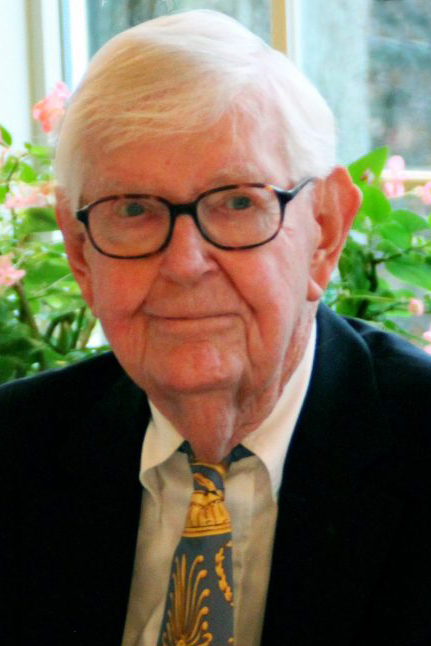 • William Leuchtenburg, William Rand Kenan Jr. Professor Emeritus and among the most distinguished scholars ever to serve on UNC’s faculty. Earlier, Leuchtenburg taught at Columbia University (1952-82), where he developed a national reputation as a leading expert on the presidency of Franklin Roosevelt. After joining Carolina’s faculty in 1982, he continued to pursue his historical research and writing, which led to a stream of highly acclaimed books. Leuchtenburg received the GAA’s Faculty Service Award in 2001.
• William Leuchtenburg, William Rand Kenan Jr. Professor Emeritus and among the most distinguished scholars ever to serve on UNC’s faculty. Earlier, Leuchtenburg taught at Columbia University (1952-82), where he developed a national reputation as a leading expert on the presidency of Franklin Roosevelt. After joining Carolina’s faculty in 1982, he continued to pursue his historical research and writing, which led to a stream of highly acclaimed books. Leuchtenburg received the GAA’s Faculty Service Award in 2001.
